Geolocation is a relatively new feature in the recent versions of most browsers. It allows websites to track your physical location, ostensibly, with a view to offer you location related search results, services, or options.
You may have noticed that whenever you visit any website which requires access to your location the first time, you will see your browser saying that this website requires access to your location. We have the option to allow or disallow access, but we normally allow this. When you allow access, your IP address, along with your device details, MAC address, etc can be sent. These details are saved in Cookies. Other websites will not be able to access this data – only the website you have given access to.
The privacy-conscious among you may not want to disclose their physical location. Such users can tell their browsers to deny access by disabling the Geolocation feature. By disabling geolocation in your browser, you can prevent websites from tracking your location. Let us see how to do it in Chrome, Edge, Firefox and Opera browsers.
All the main web browsers are capable of tracking your location due to geolocation features. When the geolocation feature is active, the browser can track its users via Wi-Fi, network, or IP address location. Now, in most instances, having the ability to track is quite useful for some applications, but others do take advantage of this.
Privacy is one of the main reasons why users should think twice before giving websites or apps access to their location through the web browser. Not every website follows the rules, meaning they could use your location in ways that compromise privacy tremendously.
What is Geolocation?
OK, so, as we mentioned earlier, geolocation is designed to pinpoint the user location and tie to the web browser or application currently in use. Most of these services tend to use the connected network along with the IP address in a bid to get an accurate representation of your location.
Now, we can understand why many internet users would want to use geolocation. Some websites will ask you to provide your location in order to deliver accurate information relevant to your area, and this is great.
However, your privacy should matter more than accurate data from a website, so if you want to learn how to keep things in check, well, we have you covered.
How to fake your web browser location
The best way to fake your location effectively is to use a VPN service and nothing else. But web browsers too allow you to block Location access to websites, although this may not always work. For best results, before you make the changes mentioned below, it is a good idea to clear all your browser cache, cookies, etc. These posts will show you how to do it in Edge, Chrome, Firefox, and Opera. Also, make sure that you have not already given permission to any sites to access your location; and if you have, then remove those sites. You will see these settings under Privacy & security settings.
Disable geolocation in Chrome
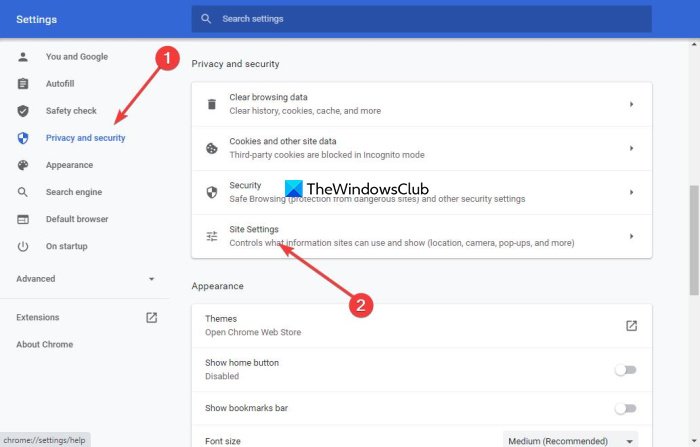
- Open Chrome browser
- Open Chrome Settings
- Select Privacy and security
- Click on Site settings
- Enable Ask before accessing toggle
- Restart the browser.
When it comes down to Google Chrome, the task of turning off geolocation features is just as simple. First, the user must click on the three vertical dots menu icon at the top-right to release the drop-down menu.
From there, navigate to Settings > Privacy and Security > Site Settings > Location. You should now see the option to Ask before accessing. Make sure this is toggled on, though it should be on by default, so if it is off, then you or someone else made some changes.
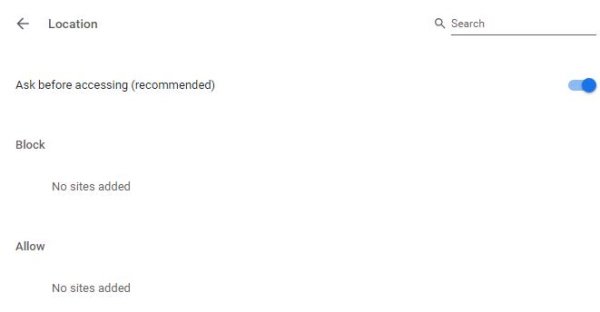
Unfortunately for us, Google Chrome doesn’t make it possible to turn off this feature completely, but Firefox does, as we can see from above.
Turn off geolocation in Microsoft Edge
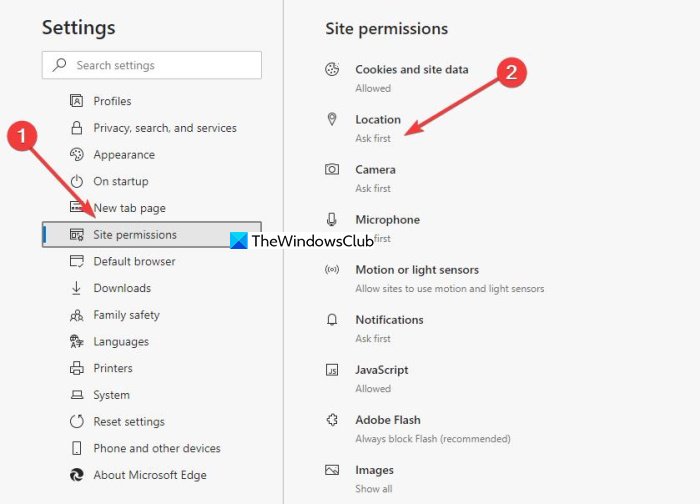
- Open Microsoft Edge browser
- Open its Settings
- Navigate to Site permissions
- Click on Location
- Enable Ask before accessing toggle
- Restart the browser.
Since this web browser uses the same rendering engine as Google Chrome, one should not expect a massive difference in how certain features operate, for example, the inability to turn off geolocation completely.
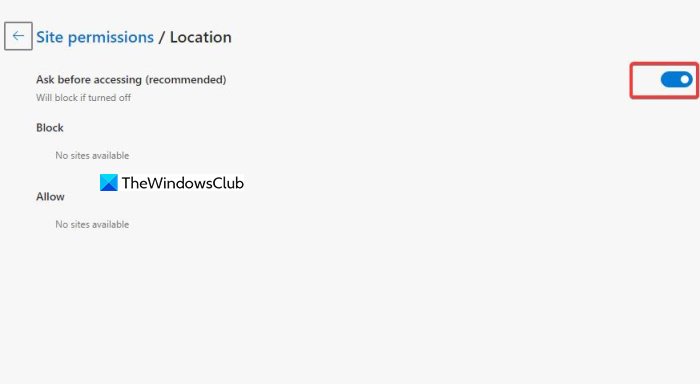
To get things moving, open Microsoft Edge, then click on the horizontal dots at the right-top section of the browser, then from there, navigate to Settings > Site Permissions > Location. After that, move to toggle on Ask before accessing, and that’s it for that.
Disable geolocation in Firefox
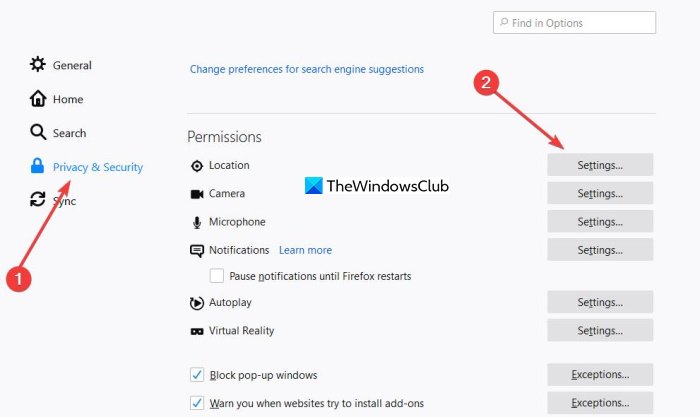
- Launch Firefox
- Open its Settings
- Select Privacy & Security
- Locate & open Locations Permission Settings
- Select Block new requests asking to access your location for the websites
- Save Changes and Exit.
Let us talk about this in greater detail.
If you’re the type of person who prefers to use Firefox than anything else, then let us explain how to get things under control.
To access the Firefox location settings, please click on the hamburger menu icon at the top-right and then navigate to Options > Privacy Security. Next, scroll until you come across the heading with the title, Permissions, and look for Location.
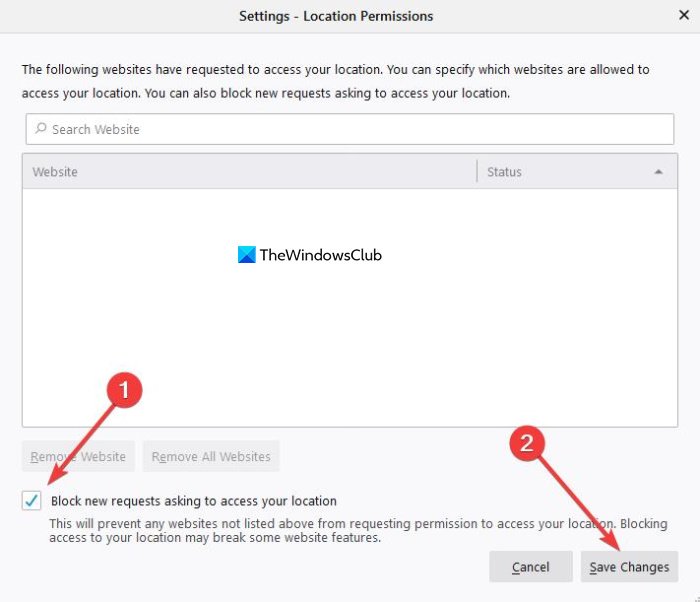
Select the Settings option beside it, and be sure to click the box that says, Block new requests asking to access your location. Finally, hit Save Changes, and that should do it.
Disable Geolocation in Opera browser
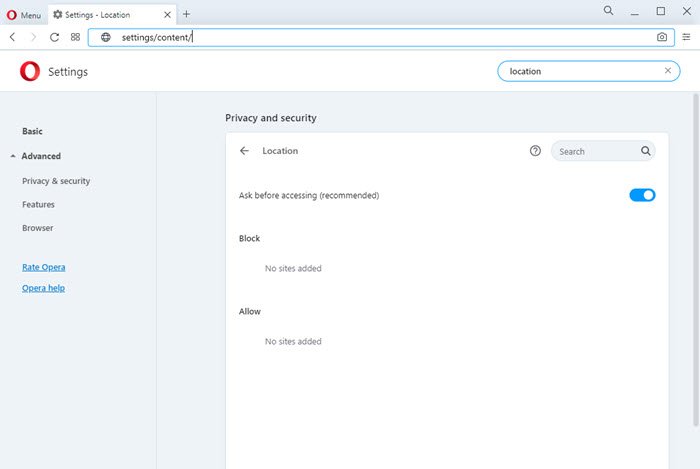
- Open your Opera
- Navigate to Open Settings > Advanced > Privacy & security
- Locate Permissions > Locations.
- Toggle the Ask before accessing switch to the On position.
- Click OK and exit.
Once you have done this, you should clear your Internet cache, Browser History & Cookies, and restart it, before you start using your browser.
Disable Geolocation in Internet Explorer
Open Internet Explorer > Internet Options > Privacy tab.
Under Location check Never allow websites to request your physical location.
Also press the Clear Sites button to remove old sites that have access to your physical location.
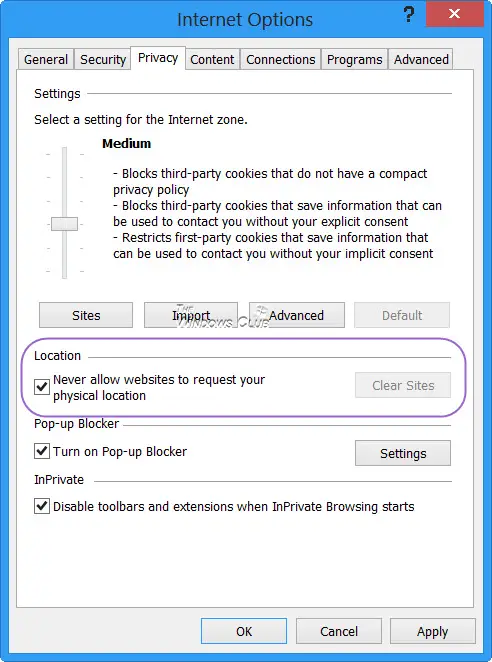
Click Apply/OK and Exit IE.
The registry key affected by the change of this setting is:
HKEY_CURRENT_USER\Software\Microsoft\Internet Explorer\Geolocation
The value of BlockAllWebsites as 1, will mean Do not allow, whereas 0 would mean Allow websites to request your location.
This will block all websites from using Microsoft Location Services to find your computer’s approximate physical location.
We trust you found the post helpful.
Have a nice day!
thank you this is the best way to get rid of hackers :P
If the device has no GPS in it, then the location is done by simply geolocating the IP address. In many parts of the world, the IP address is that of one of the ISP’s regional point-of-presence (POP) locations which services many tail-circuited physical locations that are sometimes many, many miles away.
For example, I’m an AT&T DSL customer, physically located in Napa, California. However, when I look to see what IP address the Internet thinks I’m using…
http://addgadgets.com/ipaddress/
…and where said IP address is physically located (or at least the Internet THINKS it’s physically located), it shows that I’m about a hundred miles away from Napa in either Hayward, or San Leandro, or San Jose (or several other places in that general area), depending on what IP address was last dynamically allocated to my tail-circuited DSL connection way up here in Napa.
The IP address is allocated by ARIN to AT&T, which has registered it with ARIN down in one of those regional POP locations. Then whenever my DSL connection way up here in Napa needs an IP address, one is assigned from whichever of those distant regional POPs has room for me at that particular moment.
Because of this, no website using my IP address to geolocate me may get it accurate to within even a hundred miles! Oh, sure, a court of law could order AT&T to divulge that it was the DSL circuit associated with my home telephone number that was using the IP address in question at whatever date and time the court orders it to so divulge; and so I’m not saying that I can’t be located, based on my IP address. I’m simply saying that websites which geolocate using IP addresses can only get it accurate to within a hundred miles of where I’m actually physically located. Of course the fact that I happily sign posts like this with my city and state; that that my street address and phone numbers are freely available on my website and in a gazillion other places probably helps. But my point is that normal, simple website geolocation based on IP address ain’t gonna’ feed the bulldog in at least my case, at least when I’m on my AT&T home DSL connection.
And I’m far from the only one. Verizon, for example, is notorious for registering in Washington, DC and other places many of the IP addresses which it uses all across the south and southeast United States… and now even further north. And there are many, many other similar examples. Geolocating by IP address has, for several years, now, become less and less accurate, depending on the ISP.
It depends on the ISP, though. Some ISPs quite accurately register their IP addresses with ARIN such that geolocation is accurate to at least the city or town. But many of the really big ISPs can’t afford to do that. They need to keep all IP addresses intendef for use in very large areas assigned to regional POPs which serve customers both near and far. In my case, I’m always far.
Now, all that said, if I’m at the other end of town, using someone’s WI-FI, well, then, who knows. If they’re using a different ISP whose local NAPA connections are all using local Napa-assigned IP addresses, then that’s another matter altogether. But I’m just sayin’ that whenever I’m at home, using my notebook on a hard-wired or WI-FI connection that’s fed by my AT&T DSL, then I simply cannot be accurately geolocated by websites which use IP addresses to so locate. Period.
And many, many places around the globe are like that.
Now, if turned-on the GPS in my notebook, or used my cell phone either via 2G/3G/4G or via WI-FI; and if the browser can read GPS data from the device (either because it’s a feature built-in to said browser, or because there’s a plugin or extension that allows it), and the website is capable of collecting said data from said browser…
…well, then, all bets, at that point, would be off. At that point, the website could potentially geolocate me to within three or so feet of accuracy. But I never turn on the GPS in my notebook; and I give phone apps (or phone-accessed websites) permission to geolocate me only very rarely. I obviously turn on GPS in my phone for any mapping apps, the Yellow Pages app, and/or anything else that can really only help me if it knows where I and my phone are physically located; but GPS in the phone is off at all other times.
If one is aware of how things work, and sets one’s browser to always ask about location, and pretty much always answers “no” unless there’s a darned good reason to do otherwise, then it’s really kinda’ not that big of a deal in the master scheme of things. Like pretty much anything and everything else about the Internet, one must use one’s head, and not always say “yes” to everything that every pop-up requests. The Internet is there to serve us, not the other way around. Oh, sure, it may THINK it’s the other way around, but if we take both control and responsibility for how we connect, and what we both do and allow once we’re connected, then geolocation is not really a problem.
Or so, in any case, it is my opinion.
Hope that helps!
______________________________
Gregg L. DesElms
Napa, California USA
gregg at greggdeselms dot com
When GPS is not available and the PC has an active WiFi connection, that is what the browsers use to triangulate the computer’s position. It is incredibly accurate…In this case, the IP Address has nothing to do with it, they use maps made out of billions of MAC addresses and from there, they start to triangulate the position of a computer in relation to the routers and NIC’s close by.
what do you do if the do not allow tracking of my physical location on Internet Explore is grayed out and it won’t let you select it? No body anywhere seems to know what causes this.
what could be the other hurm that occure by disabling the ip tracking button? will some helpfull tell!
1) Are you trying to enable the Location Sharing settings from the “PC Settings > Privacy > Location” on the computer?
2) Did you turn
ON the Windows Location Platform from the “Location Settings” in
Control Panel?
I would suggest you to check if the “Windows Location Platform” is turn
OFF in the “Control Panel > Location Settings”. If yes, then please turn it
ON and then check if that resolves the issue. Please try these steps:
a) Go to the Desktop Interface and press “Windows Logo” + “X” keys on the keyboard and click on “Control Panel” from that
menu.
b) Change the “View by” option from “Category” view to “Large icon” or “Small icon”
view.
c) Click on “Location Settings”.
d) Then, turn
ON the “Windows Location Platform” from that page.
e) Click on “Apply” and then “OK”.
f) Now, go to the “PC Settings > Privacy > Location” and check if you are able to enable the Location Sharing settings.
This works. I had the same problem….I am glad I was able to help
It doesn’t help much. I tried all of them but then it seems chrome is able to guess it from the IP address and also the rest of them as well.
BS.. my router do not have GPS and it’s connected to my own ISP that thinks I am 500 kilometers away from where I really are.. there is no difference when I use wifi och the lan cable connected computer, and one more thing, I live outside the city and closest Wifi network are my neighbour 4km away.. can you tell me how triangulation are supposed to work in my case, sir?
thank you this was very helpful
yes it was
worked like a charm! it was bugging the heck out of me until I read your solution. thanks so much!
By driving around with a wifi receiver and a GPS, the location of wifi base stations can be recorded. See https://wigle.net/
This DOES NOT hide your location in FF. You should go to about:config and disable geo.enabled
Doesn’t work. At all. I’ve got Firefox set up to tell websites I don’t want to be tracked, but they’re tracking my location anyway. Telling Google not to track me is about as effective as telling Ed Gein that murdering is wrong, and for roughly the same reasons. Is there any way to actively prevent them from tracking me.
In IE, do you really mean UNCHECK “never allow websites to request your physical location” It seems the that the other browsers, you say to check it.
Thanks. Edited. :)
No problem. :)
disble geo.enable in about:config
Tried it. Doesn’t work.
Tried it and my ip address was not picked up by wifi and I couldn’t connect to the internet. I hate that we’re being spied on but I have to be able to connect to the internet.
“The value of BlockAllWebsites as 1, will mean Do not allow, whereas 0 would mean Allow websites to request your location.”
^^ The article did not specify whether the value for “BlockAllWebsites” is Decimal, or Hexadecimal. We have to assume that it’s Decimal (as it only makes sense. :))
WOW thank you very much!
Shouldn’t this be at the beginning rather than “after” people tweak any settings . . . .
Please read the entire post & the comments first, create a System
Restore Point before making any changes to your system & be careful
about any 3rd-party offers while installing freeware. . . ???????
Thank you again.
Didn’t work 4 me :(
Windows 10, IE 11, Privacy->Never allow to track… is greyed out, like with Fed77.
No “Location Settings” under Control Panel in windows 10. Region is set to another location than tracked one.
Used regedit to update BlockAllWebSites to 1, doesn’t help
Reinstalled IE 11, still didn’t do it.
Switching browser:(
Except there needs to be a system wide method of doing this. Clearly Windows is allowing the browsers to access your IP address, Network list and Mac Addresses of your network, PC etc. This is a serious security hole. They take all these other security issues heavily yet leave this big gaping hole into the security of your LIFE by telling every spook and hacker on the internet from North Korea to Russia to Aleppo your exact location. What the hell? Microsoft needs to close this hole and seal it tight and erase any further development of it. How stupid can they all be?
The only problem with that is you end not being able to access the internet and MUST have your geo location enabled in ALL your browsers to do so. It’s not fair and very intrusive but that’s the way it is thanks to services like GOOGLE.